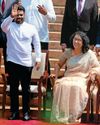
As much as overexcited broadcasters would like you to believe so, India taking on Pakistan in a cricket match is not war. Ask the Afghans. They know war.
They started playing cricket because of war.
When the Soviets invaded Afghanistan in December 1979, thousands of Afghans fled, many on donkeys, to neighbouring Pakistan. It was in the refugee camps of Peshawar that the boys first heard of this new game called cricket. (There are records of British soldiers playing the sport in Kabul, but it didn’t stick as it would in many colonies.) The boys would start playing with sticks for bats and rolled-up plastic bags for balls. The odd tennis ball was a godsend.
A few years later, the country that gave them refuge would win the World Cup. It was a moment of joy for Imran Khan’s “cornered tigers”, but also for the proud Pashtuns. Though divided by a border, a lot of south Afghanistan and north-west Pakistan lies in the historical region of Pashtunistan.
It was from these camps that a rock of Afghanistan cricket would emerge. Mohammad Nabi’s family moved to Pakistan in the 1980s. They were relatively well off, and started businesses and families there. Nabi was born in Peshawar and played cricket in the camps. “I used to hide from my parents and play cricket in school,” he told the UN refugee agency in an interview. “There was no future then in cricket; now we are a proper country with a real team.”
The family, like many others, returned to Afghanistan once the Taliban regime fell in 2001. “It felt strange when I first came back,” he said in the same interview. “The war had spared nothing; everything was broken. But now, buildings have been rebuilt, roads repaired, markets reopened. We have cricket grounds and proper academies; earlier we had nothing.”
Esta historia es de la edición October 29, 2023 de THE WEEK India.
Comience su prueba gratuita de Magzter GOLD de 7 días para acceder a miles de historias premium seleccionadas y a más de 9,000 revistas y periódicos.
Ya eres suscriptor ? Conectar
Esta historia es de la edición October 29, 2023 de THE WEEK India.
Comience su prueba gratuita de Magzter GOLD de 7 días para acceder a miles de historias premium seleccionadas y a más de 9,000 revistas y periódicos.
Ya eres suscriptor? Conectar

RED TIDE RISING
Sweeping win for Sri Lanka's ruling leftists in parliament polls raises hope for progressive economic growth

Hat-Trick Or Has-Beens?
India look to win their third straight Test series in Australia, but ageing superstars and recent humiliation at home have cast a shadow on their hopes

Constipation Can Put Your Heart At Risk
PEOPLE WITH CONSTIPATION have an increased risk of major cardiac events, including heart attack, stroke and heart failure, especially if they also have high blood pressure, finds an international study published in the American Journal of Physiology-Heart and Circulatory Physiology.

Too Much Sitting Can Accelerate Ageing
SITTING FOR EXTENDED PERIODS can harm the heart and accelerate ageing, even if you are young and get the minimum recommended amount of daily exercise, according to a US study published in the journal PLOS One.

Efficiency and innovation
As health care evolves, professionals must employ innovative methods to refine their skills

Level up
Only 30 per cent of needy patients are able to undergo transplant in India; we need more dedicated transplant centres

HOPE STEMS FROM A CELL
While stem cell therapies have shown success in treating blood disorders, orthopaedic ailments, autoimmune diseases and eye issues, there is hope that they can one day treat patients with heart disease, blindness, Parkinson's, HIV, diabetes and spinal cord injuries

Mind matters
Your mindset can limit or expand your physical ability

Cutting edge
Would you go under the knife if a robot was the one holding it? Or would you say, \"No way, I need a human touch\"? You might have to decide soon because a robot that can imitate skilled human surgeons is already here.

The smallest cut
Minimally invasive surgeries have a bright future, with virtual reality and 3D procedures offering greater precision and AI on the horizon